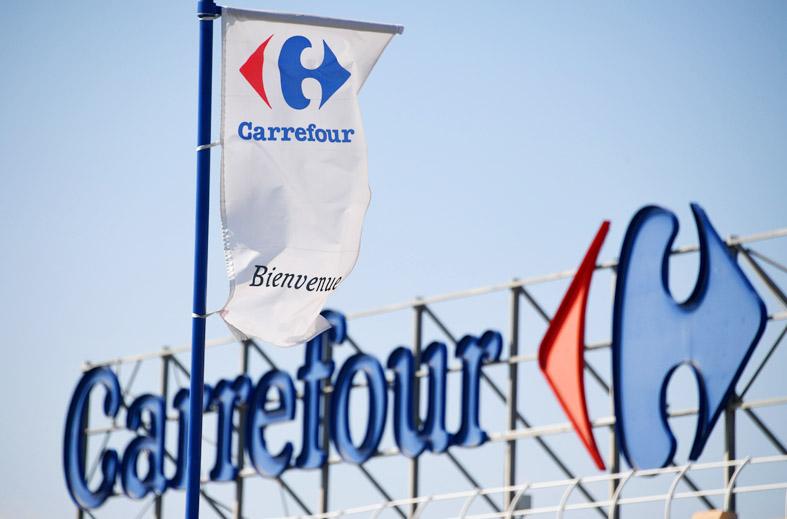Alimentation Couche-Tard Inc, the convenience-store giant that owns the Circle K chain, on Tuesday said that it is exploring a transaction with French grocer Carrefour SA, a deal that would represent a major strategy shift for the Canadian firm.
Couche-Tard said that it has started “exploratory discussions” on a friendly deal with Carrefour, confirming an earlier Bloomberg News report.
There is no certainty the talks would lead to a transaction, the Quebec-based company said.

Photo: AFP
Shares of Carrefour have risen 10 percent in Paris trading this year, giving the company a market capitalization of 12.6 billion euros (US$15.4 billion) at Tuesday’s close.
Couche-Tard shares slipped 2.2 percent after the initial Bloomberg report, closing at C$41.31 in Toronto to value the company at almost C$46 billion (US$36 billion).
Representatives for Carrefour could not immediately be reached for comment.
Couche-Tard’s focus has been convenience stores and gas stations, not supermarkets. It has built an empire by methodically acquiring smaller rivals, first at home in Canada before entering the US in 2001 and Europe in 2012.
Lately, its focus had been on the US and Asia-Pacific regions, where it tried to buy Caltex Australia Ltd before deciding against a revised offer during the COVID-19 pandemic.
A deal with Carrefour would expand its presence in Europe, where its potential target operates more than 2,800 supermarkets and 703 larger-format hypermarkets, and in Latin America, where it has stores in Argentina and Brazil.
Couche-Tard, which started from a single store in a Montreal suburb in 1980, has a no-frills reputation, with top management known for visiting scores of stores to spot weaknesses before making acquisitions.
It agreed in 2016 to buy US gas-station operator CST Brands Inc for about US$4 billion, and gained a foothold in Scandinavia and the Baltic region through its 2012 purchase of Statoil Fuel & Retail ASA.
Last year, it was among potential suitors competing to acquire US gas station operator Speedway, which was eventually sold to Seven & i Holdings Co for US$21 billion.
Couche-Tard has a network of more than 9,000 convenience stores in North America, most of which also offer fuel, according to its Web site.
It also had about 2,700 locations in Europe as of October last year.
A pioneer of the hypermarket format, Carrefour lost ground in the past few years to Leclerc SA and German discounters in France, while forays into overseas markets such as Latin America and China have produced mixed results.
Carrefour two years ago sold an 80 percent stake in its China unit to local retailer Suning.com Co (蘇寧易購). It had about 5.2 billion euros in net debt as of June last year, down from almost 6 billion euros a year earlier, partly due to proceeds from the China deal.
Carrefour has held up fairly well during the pandemic. It posted its strongest revenue growth in at least two decades during the third quarter, as an increase in the number of people working from home boosted demand for groceries.

SEEKING CLARITY: Washington should not adopt measures that create uncertainties for ‘existing semiconductor investments,’ TSMC said referring to its US$165 billion in the US Taiwan Semiconductor Manufacturing Co (TSMC, 台積電) told the US that any future tariffs on Taiwanese semiconductors could reduce demand for chips and derail its pledge to increase its investment in Arizona. “New import restrictions could jeopardize current US leadership in the competitive technology industry and create uncertainties for many committed semiconductor capital projects in the US, including TSMC Arizona’s significant investment plan in Phoenix,” the chipmaker wrote in a letter to the US Department of Commerce. TSMC issued the warning in response to a solicitation for comments by the department on a possible tariff on semiconductor imports by US President Donald Trump’s

The government has launched a three-pronged strategy to attract local and international talent, aiming to position Taiwan as a new global hub following Nvidia Corp’s announcement that it has chosen Taipei as the site of its Taiwan headquarters. Nvidia cofounder and CEO Jensen Huang (黃仁勳) on Monday last week announced during his keynote speech at the Computex trade show in Taipei that the Nvidia Constellation, the company’s planned Taiwan headquarters, would be located in the Beitou-Shilin Technology Park (北投士林科技園區) in Taipei. Huang’s decision to establish a base in Taiwan is “primarily due to Taiwan’s talent pool and its strength in the semiconductor

Industrial production expanded 22.31 percent annually last month to 107.51, as increases in demand for high-performance computing (HPC) and artificial intelligence (AI) applications drove demand for locally-made chips and components. The manufacturing production index climbed 23.68 percent year-on-year to 108.37, marking the 14th consecutive month of increase, the Ministry of Economic Affairs said. In the first four months of this year, industrial and manufacturing production indices expanded 14.31 percent and 15.22 percent year-on-year, ministry data showed. The growth momentum is to extend into this month, with the manufacturing production index expected to rise between 11 percent and 15.1 percent annually, Department of Statistics

An earnings report from semiconductor giant and artificial intelligence (AI) bellwether Nvidia Corp takes center stage for Wall Street this week, as stocks hit a speed bump of worries over US federal deficits driving up Treasury yields. US equities pulled back last week after a torrid rally, as investors turned their attention to tax and spending legislation poised to swell the US government’s US$36 trillion in debt. Long-dated US Treasury yields rose amid the fiscal worries, with the 30-year yield topping 5 percent and hitting its highest level since late 2023. Stocks were dealt another blow on Friday when US President Donald